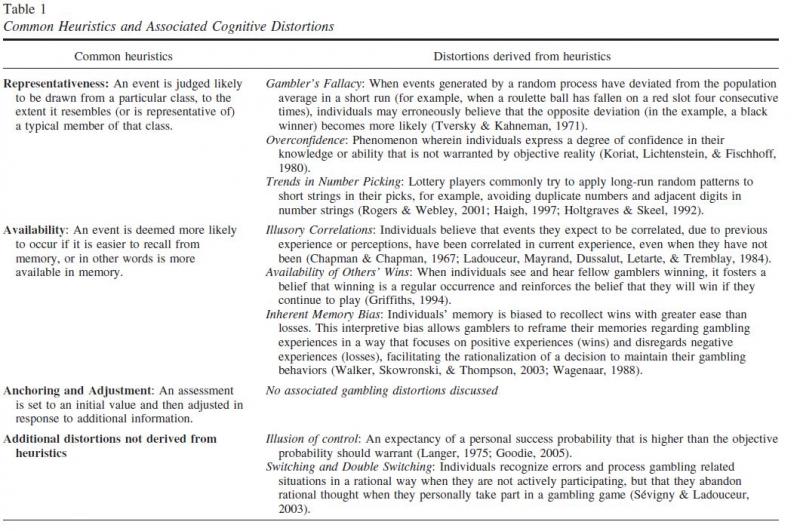NCRG-Funded Study Examines How Cognitive Distortions Affect Gambling Disorders
Do people with gambling disorders think differently than those without? The answer is yes and no. One might assume that a person who is diagnosed with a gambling disorder must predictably and consistently make harmful choices. While this thought is true, research on decision making has shown thatallhumans make consistent and predictable cognitive errors (Tversky & Kahneman, 1974). Thus, finding and exploring the differences in cognitive errors made by people with and without a gambling disorder may offer valuable insights into understanding how gambling disorders impact the decision-making process. Correcting these cognitive distortions is also an important element in several common treatments for pathological gambling, and it has been theorized that merely teaching probability and reasoning skills may be able to prevent pathological gambling before it starts (though research has not yet supported this theory).

It is extremely important for researchers who want to have a greater understanding of gambling disorders and potentially effective treatment methods to begin by studying cognitive processes and decision-making errors. A recent article in the journalPsychology of Addictive Behaviors, funded by a grant from the NCRG, examines the history and theory of cognitive distortions, how they relate to research on pathological gambling and how they affect treatment outcomes (Fortune & Goodie, 2011).
The researchers began with Kahneman and Tversky’s groundbreaking concept of “heuristics.” A heuristic is a mental shortcut that people use to make decisions with uncertain outcomes. For example, the concept of “availability” is a heuristic – people believe an event is more likely to occur if it is easier to bring to memory. A person may believe that those who play slot machines win more often than those who do not because every win on a slot machine is accompanied by lights and sounds, while losses are not accompanied by any memorable fanfare. (A complete list of the heuristics and the cognitive distortions they may cause is available in the table below (Fortune & Goodie, 2011, p. 4).)
In addition to examining common cognitive distortions, the authors also examined the effectiveness of treatment methods for pathological gambling if these misperceptions were corrected. One method, cogitative behavioral therapy (CBT), is a common talk therapy method that attempts to correct emotional and behavioral dysfunction with systematic, goal-oriented procedures. Cognitive restructuring (CR) is the process of learning to identify and challenge irrational thoughts and is often incorporated within CBT.
After examining several studies that included this method of treatment, the authors concluded that both CBT and CR produced positive outcomes for people with PG. Additionally, individual therapy sessions worked better than group therapy session. Researchers also discovered that receiving more hours of therapy did not necessarily lead to better treatment outcomes.
For more information about the article inPsychology of Addictive Behavior, visit thejournal’s website. Do you have a question or comment about this study? Leave a comment below.

References
Fortune, E. E., & Goodie, A. S. (2011). Cognitive distortions as a component and treatment focus of pathological gambling: A review.Psychology of Addictive Behaviors: Journal of the Society of Psychologists in Addictive Behaviors. doi:10.1037/a0026422
Tversky, A., & Kahneman, D. (1974). Judgment under Uncertainty: Heuristics and Biases.Science (New York, N.Y.),185(4157), 1124–1131. doi:10.1126/science.185.4157.1124
NCRG staffResearch UpdateNCRG-funded research

